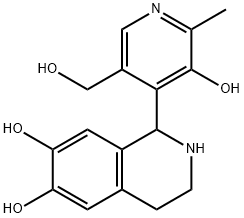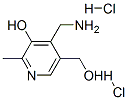Pyridoxamine dihydrochloride , 98% , 524-36-7
Synonym(s):
4-(Aminomethyl)-5-hydroxy-6-methyl-3-pyridinemethanol dihydrochloride;Pyridoxamine, Dihydrochloride - CAS 524-36-7 - Calbiochem
CAS NO.:524-36-7
Empirical Formula: C8H14Cl2N2O2
Molecular Weight: 241.11
MDL number: MFCD00012808
EINECS: 208-357-6
| Pack Size | Price | Stock | Quantity |
| 1G | RMB34.40 | In Stock |
|
| 5G | RMB120.80 | In Stock |
|
| 25g | RMB447.20 | In Stock |
|
| others | Enquire |
PRODUCT Properties
| Melting point: | 224-226 °C (dec.)(lit.) |
| Density | 1.4025 (rough estimate) |
| refractive index | 1.6100 (estimate) |
| storage temp. | Inert atmosphere,Store in freezer, under -20°C |
| solubility | DMSO (Slightly), Methanol (Slightly), Water (Slightly) |
| form | Powder or Solid |
| pka | pKa 3.31(H2O
t = 25
I = 0.1)(Approximate) |
| color | White to off-white to pale brown |
| biological source | synthetic (organic) |
| Water Solubility | Soluble in DMSO, water, or methanol
/n |
| Merck | 7980 |
| BRN | 3632748 |
| CAS DataBase Reference | 524-36-7(CAS DataBase Reference) |
Description and Uses
Pyridoxamine dihydrochloride is a salt and amine form of pyridoxamine, which belongs to the family of vitamin B6 compounds. Pyridoxamine occurs naturally in animal-based food products. Its deficiency in humans potentially causes sideroblastic anemia, weakness, insomnia, and neurological disorders. It has been reported to be effective against diabetic nephropathy. Pyridoxamine dihydrochloride acts as a catalyst in the metabolism of fats, carbohydrates, and proteins in the body, thereby assisting in maintaining energy balance in kidney disease patients.
Pyridoxamine dihydrochloride (Pyridorin, NephroGenex, 524-36-7) inhibits formation of advanced glycation end products and scavenges reactive oxygen species and toxic carbonyls. Whether these effects translate into kidney protection is unknown, although a year-long study of the effects of pyridoxamine dihydrochlo-ride in patients with type 2 diabetes and proteinuria failed to show a difference in kidney function decline with pyri-doxamine dihydrochloride in daily doses of 300 or 600 mg versus placebo treatment.
Safety
| Symbol(GHS) |  GHS07 |
| Signal word | Warning |
| Hazard statements | H315-H319-H335 |
| Precautionary statements | P261-P280a-P304+P340-P305+P351+P338-P405-P501a |
| Hazard Codes | Xi |
| Risk Statements | 36/37/38 |
| Safety Statements | 26-36 |
| WGK Germany | 2 |
| RTECS | UV1230000 |
| HazardClass | IRRITANT |
| HS Code | 29333990 |
| Toxicity | cat,LD50,intravenous,540mg/kg (540mg/kg),GASTROINTESTINAL: CHANGES IN STRUCTURE OR FUNCTION OF SALIVARY GLANDSBEHAVIORAL: CONVULSIONS OR EFFECT ON SEIZURE THRESHOLDGASTROINTESTINAL: "HYPERMOTILITY, DIARRHEA",Arzneimittel-Forschung. Drug Research. Vol. 11, Pg. 922, 1961. |





